
Benny (left) and Josh Safdie. (Photo by Jason Smith/Everett Collection)
Fans of the Safdie Brothers – New Yorkers Benny and Josh, who’ve been fraying nerves in recent years with Certified Fresh thrillers like Good Time and Heaven Knows What – will likely be unsurprised to see the titles on their respective top fives. There’s physical comedy (Chaplin) and restless cameras (Altman); there’s big NYC energy (Scorsese) and big bravura performances (Pacino). All of those traits are evident in their latest nerve-wracking/funny/thrilling film, Uncut Gems, the Certified Fresh festival hit that had some betting star Adam Sandler would earn his first Oscar nomination, even though that didn’t come to pass. The movie is set in the Diamond District of Manhattan, and follows jeweler Howard Ratner (Sandler) as he chases a massive windfall, manages his relationships with two women, and dodges the approach of various underworld figures. And Kevin Garnett shows up in there, too.
With the movie now in theaters everywhere, Josh and Benny shared their Five Favorite Films – each – with Rotten Tomatoes, with Benny being sure to note that “you could swap out all of them” as the guys have overlapping tastes. Plus, they told us about the gestation of the Uncut Gems story and why Adam Sandler was the only one for the role.
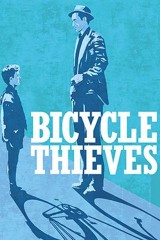
You know, it’s tough to really summate your favorite movies, and it changes so often based on your vibe and things like that. When I was thinking about it, I was trying to think of what are the movies that continually show up in the top 10. And I landed on The Bicycle Thief – or Bicycle Thieves; sometimes people say “thief,” sometimes say “thieves.” [Director Vittorio] De Sica’s Bicycle Thief is like a north star project for me. First of all, it’s arguably the greatest film in the father-son series. It’s one of the bits of neo-realist masterpiece.
The way that De Sica aligned it with his casting and the themes of his movie is always an inspiration. The fact that he saw Lamberto Maggiorani at the audition, that he showed up with his son – he’s a factory worker who showed up with his son – he immediately said, “Oh, this is the guy who needs to play the character.” And the fact that he cast the kid, Enzo, off of the street while they were filming, who was selling flowers for his father. The fact that De Sica had the vision to try to blur the lines, starting with casting and then, towards the climax of the movie he shot, he modeled his production around the release of a soccer match. So that he knew he was going to have hundreds upon thousands, thousands upon thousands of people leaving the stadium at the same time. And he would shoot around. He’s using reality as the fabric of his fiction film. And that, to me, makes it an ultimate masterpiece of all time.
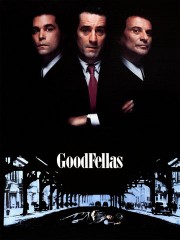
My favorite Scorsese film. I think maybe the greatest film ever made – up there with Bicycle Thieves… or “thief.” Goodfellas has the capability of condensing and expanding time at the same moment. It has the ability to at once sensationalize and also criticize the actions of the characters. You go from fearing to loving them at the same time. It has the courage to put Ray Liotta in the lead role of that film after seeing him as a supporting player in Something Wild, which is transcendent. His performance in Something Wild is amazing. But Scorsese knew to cast the guy who doesn’t look full-on Italian, even, you know what I mean? The fact that Liotta looks like he could never be fully made. The fact that Liotta looks like a cokehead from Long Island.
The casting, again, with that film, is so superior to anything ever made, really. I mean, just filling that film with what feels like real gangsters. What he does with Steadicam! The way he uses camera movement with that film. The way [cinematographer Michael] Ballhaus worked with the founder of the Steadicam, who operated at that Copacabana scene. The timing of the film, the fact that you have a 30-minute sequence that feels like four minutes. The fact that he cast the real DEA agent who arrested Henry Hill to reenact the scene from his life is genius. Scorsese is the master.
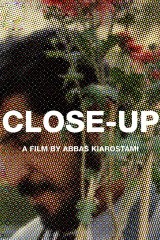
Close Up by Abbas Kiarostami. The way that that film blends fiction and reality, it is a north star for me. He made a movie about a contemporary Iranian filmmaker named Mohsen Makhmalbaf, and he read an article in the paper about a person who went around pretending to be this filmmaker in order to scam a family out of money and resources. And he went and cast the guy who was going around pretending to be Makhmalbaf, and he cast the real family that he scammed. And he recreated each scenario as if it was a script.
He used real life as a script, and you’re watching the real players re-enact something that happened recently in their life, and the result is magical. The result is something that only film can give you. It makes you question your own self. It makes you question, what is a personality? It makes you question empathy. Because you start to actually see that this guy is actually a great actor, the main guy. And then you have one of the most complicated moments in all movies, when Makhmalbaf himself picks up the guy from the prison and rides on a motorcycle through Tehran. Masterpiece.
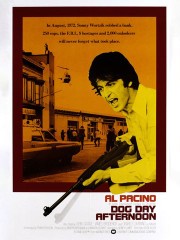
[Sidney] Lumet, Dog Day Afternoon. I mean, I don’t know what there is to say about Al Pacino’s performance as John Wojtowicz. But it’s a really complicated, really emotionally messy, but driven performance. Now there’s a documentary about the real guy called “something” Dog; I forgot the name of it [editor’s note: it’s The Dog], but the doc is just as much worth seeking out. It’s almost kind of neat to see it after you watch the movie. But the way that Dog Day Afternoon unfolds almost in real time over the course of one day in Brooklyn.
And the John Cazale character. First of all, it’s just a beautiful portrait of an outlier community. The homosexual community at a specific time in New York, and that niche, there were these tough guys. They were going to do anything for their dream, anything – rob a bank. But nothing they do goes right. But watching him get wrapped up in his own ego and the drama of it and the romance; it’s one of the most romantic movies I’ve ever seen. It’s a really, really beautiful film, but it’s devastating. It’s also a very regional film. I love it.
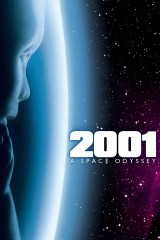
I saw the movie as a teenager and I loved it, but I didn’t know why I loved it. I loved it because it just felt like a gargantuan document about time and the history of time, but I didn’t really understand it. Then I saw it again probably in my mid-20s, and the part that I glommed on most to was – and this was pre-AI, basically pre-Siri; you could imagine me thinking about 2001 in the age of Siri. But then I watched it again probably two years ago, and it absolutely transformed itself, and I started to take different meaning from it. And I realized that, ultimately, what it was saying is that we are the aliens, and that curiosity, mankind’s curiosity, is what actually leads to our own demise in a deep, deep way. That we know something is a problem, yet we want to embrace it. I haven’t ever felt that way while watching a film. It’s such a perfect, beautiful document about the universe.
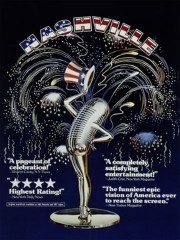
Just a preface: All of these are movies that I can’t escape. You know, there’s ones that you’re interested in, in the moment, because they’re inspiring you in certain ways. But these are ones that I’ve always kind of revisited and can always get something out of it. So Nashville is one of them. It’s such a world that I didn’t know about, and you have all of these insane concerts in real time with all of these people. All of these emotions and ideas all happening within the performances, and everything is happening almost at the same time.
And I just kept sitting there, like, how did he do this? And it just kept happening, scene after scene. There’s this one scene that’s unbelievable, when Keith Carradine’s singing the “I’m Easy” song, and you literally see the same song affecting three different people in the audience, totally differently, at the same time. It’s literally one of the most incredible experiences I’ve had. And just going in to listen to these performances and then to recall these emotions that I never had before, but I feel like they’re mine, is incredible. And the sound in that movie is an achievement that I don’t even understand how they did it with the actual performances, the audience, whatever. Incredible.
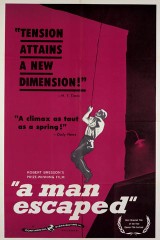
Then the second one – and let’s say, this was in no particular order – but A Man Escaped, the [Robert] Bresson movie. That has to be my favorite movie of all time, just because it always makes me cry at the end, because I feel like I’ve achieved something that the character achieves. And it tells you what happens in the title, and it makes it no less suspenseful the entire way. You’re literally feeling the sound of the gravel as he puts his foot down – those shots of the foot or the spoon going into the slot. All of these things, the editing of it, the character, the way he’s using these actors who you don’t really know, they just – you feel like they’re real people.
It’s just so perfectly put together, and it’s something where I kind of feel like I’m going along with the escape in a way that’s just done by a master. In a weird way, I feel like Bresson is the Fontaine character in that movie. But what’s weird is I’ve watched it again recently, and I had a totally different feeling of it, where it was more about society and how people are talking to each other. And then you realize Bresson is just kind of making the same movie every time, just with different [settings and characters]. One’s World War II, one’s Lancelot.

Anyway, the next one I have to say is Milestones, and that’s just because of the massive impact it had on me in general and by Robert Kramer and John Douglas. Basically, this movie put within me emotions and memories that I never had, and I was feeling them in the theater as if I had them. There’s a scene where John Douglas is playing – I think he’s playing the saxophone, and the other guy is doing some ceramics, and it’s just such a happy moment, and it’s so small. But in that moment, I’m just with them 100%, and then there’s a birth in the movie, and the birth, you’re feeling elated. Not because it’s a beautiful thing in the world, but because you’re feeling the kind of coming in of a new life as these parents. And there’s just something about the cinematography, the people, and the characters, and the colors of it all.
It’s an amazing movie. And I remember watching it being like, “OK, you can do this to an audience.” That was mind-blowing.
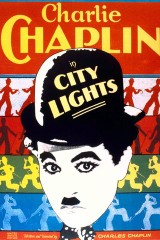
This was a tough one, because it’s like, oh, Chaplin, Buster Keaton, Chaplin, Buster Keaton. There’s something about City Lights that just… It has all of the perfect acting and physical comedy. But then there’s this pathos to that main character that is just so deep, and you feel it, and it has so many jokes. It’s one of his movies that has a lot of good jokes in it, you know, from the boxing to the cigar. Here you have this guy that’s this hobo driving a Rolls Royce, pushing another hobo out of the way to get the cigar. And it’s just, it’s one of those funny things.
That ending when you see his face and she sees him at the same time, and there’s kind of, it’s a smile, but is he sad? Is he happy? You really have no idea of the complications of what’s going on in the moment. He’s just kind of letting it go, and it’s one of the most incredible performances that can kind of put you in there. And it’s a movie that encapsulates all of the things that I love about silent movies, but in a way that has the emotional connection.
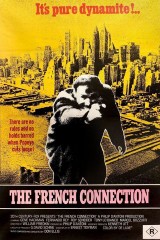
Last one. I’m going to go with The French Connection, because it’s one of the most incredible cop movies and pulp movies there is. The camera work, Gene Hackman, the shots from up on the rooftop looking down. That chase scene alone puts it on this list. You hear how they made that movie, and you really feel the bare hands that went into that thing, and it just reset how you make a movie like that. You know, totally changed the game on that level. Just seeing that car barrel through the streets, you feel the danger and you feel the pressure of all of these things. It’s doing pulp in a whole new way and in a visceral way. Then, on top of that, you have these people with real stakes and real things happening to them, and [director William] Friedkin, he’s a king.
Jacqueline Coley for Rotten Tomatoes: I know you guys said that Uncut Gems had been in your head for 10 years, this idea of telling the story with Howard. So, was this a guy that you recognize from your own personal experience? Why was Howard this character that you were always continually writing over the years?
Benny Safdie: In a weird way, the writing part of it is strange, because you have a 10-year project, you have this thing; it’s kind of like a receptacle for all of your ideas and your life. It becomes a character that becomes analogous. As a filmmaker who is hustling, trying to get work, trying to get this made, you can’t help but try to do whatever you have to do to get to see your dream come to fruition – so you can relate to Howard in that regards. But Howard, there was something about the relentlessness about Howard’s pursuit of his own dream. That and the fact that he was trying to not only realize his dream against all circumstances, but also that he was able to be a provider, that he was this guy who provided for all these people around him. He was a world-creator, and he was a vanguard world-creator. Just the idea that Howard was somebody who was never going to stop in pursuit of his dream, and knowing that, in the end, it’s going to be good for everybody. You know what I mean? There’s something about that, that was very helpful.
Josh Safdie: And I’ll just add one thing, that he is, almost in a weird way, kind of this archetypal character of a dreamer, but also there’s this kind of Jewishness to him. There’s all of these characters and literature and movies that it was a feeling of, “OK, I want to add to that. I want to build up a guy who was like these people that I’ve kind of admired, looked at.”
Rotten Tomatoes: Talk about casting Adam Sandler as this man you had built up.
Benny: Sandler was paramount, always. He’s the only person who can make Howard lovable and also infuse the character’s insane optimism as a gambler with a humor, with an element of humor, with an air of humor. The humor is so important to the way the film functions. Yes, it’s this very tense film that’s literally, like, your heart feels like it’s going to implode because it’s such a tense thriller. But without that comic relief that Sandler so effortlessly infuses into Howard, the movie just does not function. And Howard is, he’s a patriarch, and so is Sandler.
Josh: Also, whenever Sandler is in a movie, you root for him in the face of the most absurd situations. You really believe the things are happening to him and he’s feeling them. So, in this in particular, you need to be rooting for Howard to succeed, because again, all of the things fall into place after that. You know, you could not like him, but you are loving him. And if you’re yelling at the screen, you are yelling at him to not do things. And you only do that to people who you want to see good things happen to.
Rotten Tomatoes: This movie has gotten everybody all kinds of excited, but people have seen Good Time. They know how tense you guys are. Give me a quick one-liner to prep folks for what they should expect going into the film.
Josh: I think they can expect an immersive, thrilling experience that will keep you laughing on the edge of your seat to the point that you fall down and you sit on someone else’s popcorn.
Benny: Yeah. And you will also hope we have the feeling of actually moving to the edge of your seat.
Uncut Gems is in theaters everywhere.
Thumbnail image courtesy Warner Bros., Twentieth Century Fox, and Everett Collection